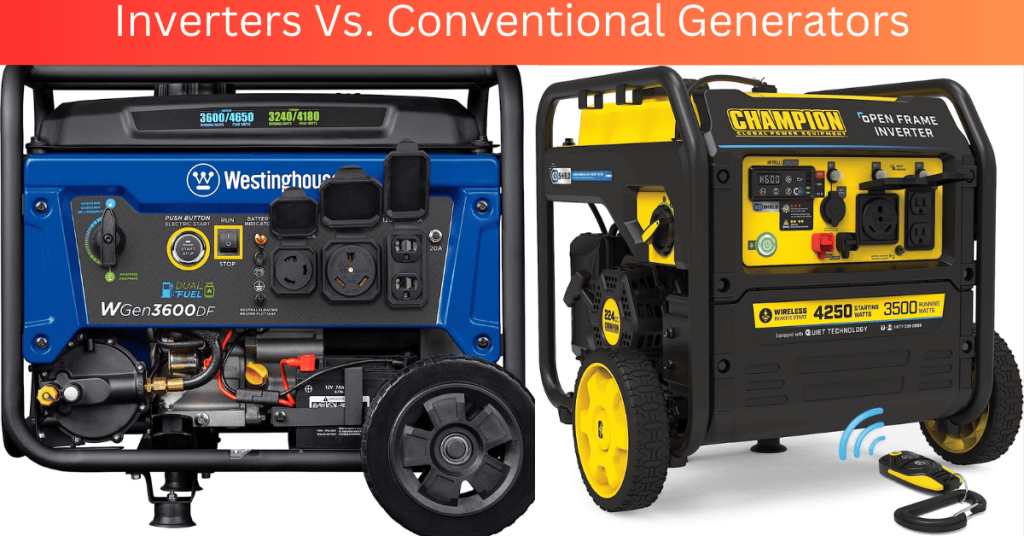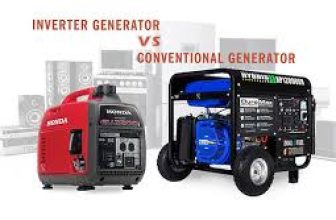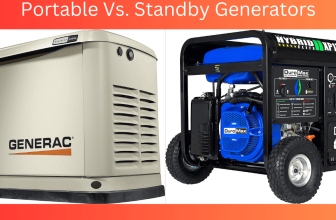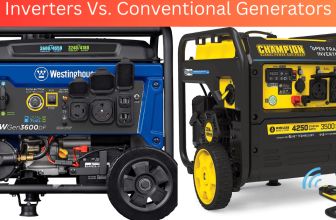Choosing between an inverter generator and a conventional generator can be daunting. But with the right information, you can make the best decision for your needs.
In this article, I’ll explain the differences between these two types of generators so that you can make an informed decision about which one is right for you.
When it comes to power sources, both inverter and conventional generators have a lot to offer. Inverter generators are lightweight and portable, making them ideal for camping and home use. They also produce clean power with low noise levels.
On the other hand, traditional generators are bigger and bulkier but are often more powerful than inverter generators. In this article, I’ll help you weigh the pros and cons of each type of generator so that you can decide which one is best for your needs.

Overview Of Inverter Generators
I’m sure you’ve heard of inverter generators – they’re becoming increasingly popular these days. But what exactly are they and why should you choose one over the conventional generator?
Inverter generators are different from traditional generators in that they use technology to produce better quality power. They have a more efficient engine that runs quieter, produces less heat, and uses less fuel than a standard generator. The internal circuitry also helps keep the power output clean and consistent by regulating voltage, frequency and waveform. This helps protect your electronics from potential damage due to surges or fluctuations in the power output.
Inverter generators are usually smaller and lighter than conventional generators, making them much easier to transport and store. They come with USB ports for easy charging of phones and other devices, as well as parallel connection ports so two units can be connected together for increased wattage capacity.
Overall, inverter generators offer many advantages over traditional models – but it’s important to consider your needs before deciding which type is best for you. Next up, let’s look at some of the specific benefits of inverter generators so you can make an informed decision about your purchase.
Advantages Of Inverter Generators
The hum of an inverter generator is like a lullaby, providing a calming sound for your outdoor activities. Its efficient and portable design lets you bring it wherever you go, so you can enjoy the adventures with peace of mind.
Inverter generators are specially designed to provide reliable power with minimal noise, meaning that you won’t disturb your neighbors or wildlife when using them. They also offer several advantages compared to conventional generators.
For one, they have a fuel-efficient engine that automatically adjusts to the amount of power required and only uses what is needed – a great way to save on fuel costs. Additionally, they are much lighter in weight than conventional generators, making them easier to transport.
And lastly, inverter generators produce clean power with low harmonic distortion which makes them ideal for powering sensitive electronics such as laptops and phones without damaging them. Inverter generators may be the right choice if you need reliable power without the hassle of dealing with excessive noise or emissions.
They are perfect for camping trips where you want to enjoy nature without creating too much disturbance. With their lightweight portability and fuel efficiency, inverter generators are an excellent option for anyone who needs reliable yet quiet power on-the-go.
Now let’s take a look at an overview of conventional generators and how they compare to inverter models.
Overview Of Conventional Generators
Well, now that we’ve gone over the advantages of inverter generators, it’s time to move on to conventional generators.
Conventional generators are generally less expensive than inverter generators, so if cost is a major factor in your decision-making process, a conventional generator could be the right choice for you. They also don’t require as much maintenance as inverter models.
However, there are several drawbacks to traditional generators. Conventional generators are loud and can be quite intrusive when in use. Additionally, they don’t have an adjustable speed like an inverter generator does. This means that they always run at full power and generate more noise than necessary when running light-load applications. Also, conventional generators typically cannot produce clean power which can damage sensitive electronic equipment such as laptops and TVs.
So while there is still a place for traditional generators in some scenarios, they may not be the best choice for most people who need reliable power for sensitive electronics or quieter operation. On to the next topic: let’s take a look at the advantages of conventional generators!
Advantages Of Conventional Generators
Are you stuck trying to decide between inverter generators and conventional generators? You’re in luck! Here, I’ll break down the advantages of conventional generators for you.
Conventional generators are great because they have a few advantages that give them the edge over inverter generators. To start with, they are generally more budget friendly than their inverter counterparts and can provide enough power to run large appliances like refrigerators and air conditioners. They also don’t require as much maintenance as inverter models do, making them a great long-term choice.
| Advantages | Disadvantages |
|---|---|
| More Budget Friendly | Noisy |
| Can Run Large Appliances | Not Portable |
| Less Maintenance Required | Polluting Emissions |
Additionally, conventional generators are reliable and can serve you well in times of power outages or natural disasters. The only real downside to them is that they can be quite noisy and may emit polluting emissions—two cons that should be taken into consideration when deciding which type of generator is right for you.
Comparing Inverter And Conventional Generators
When deciding between an inverter generator or a conventional generator, it’s important to understand the differences between them.
Conventional generators are typically cheaper and more reliable, but they lack the technology that inverter generators have. Inverter generators are quieter, more fuel efficient, and can produce cleaner power.
Conventional generators operate by using an alternator to produce AC current, which is then converted through rectifiers into DC power. The converted power is sent to a series of brushes and slip rings which create alternating current in order to power your appliances. This process is often noisy and inefficient as it wastes energy on conversion.
Inverter generators use advanced technology such as pulse width modulation (PWM) to generate AC power directly from DC power. This allows for much higher efficiency in terms of fuel consumption as well as providing clean and stable power for sensitive electronics like computers or laptop chargers. Additionally, inverters are much quieter than conventional generators due to their advanced technology.
The choice between an inverter generator or a conventional generator ultimately comes down to what you intend to use it for and your budget constraints. With the right knowledge in hand you can make an informed decision that will best serve your needs. Moving forward we will explore how to determine your specific power needs when selecting a generator.
Determining Your Power Needs
Deciding between an inverter generator and conventional generator can be a daunting task. That’s why it’s important to first determine your power needs. This will help you decide which type of generator is right for you.
The items you need to power are the main factor in determining your power needs. Make a list of all the items you want to be able to run, including how many watts they require. This will help you understand the total wattage needed.
In addition, consider any unexpected needs that may arise in the future such as running a tool or appliance outdoors or having backup power for your home during an emergency situation.
Once you know exactly what you need, organizing those items into categories can help make selecting the right generator easier. You will want one that provides enough wattage to handle your largest appliance or tool and other smaller items as well as provide some extra wattage for unexpected future needs.
With this information in hand, you’re ready to start calculating running watts and estimating fuel consumption for different models of generators – tasks we’ll dive into next!
Calculating Running Watts
It can be confusing to know which type of generator you should choose. Inverter generators and conventional generators have their advantages and disadvantages, so it’s important to consider both when making your decision.
One of the most important things to consider is running watts. It may sound intimidating, but it’s actually easier than you think to calculate!
Running watts refer to the amount of power that an appliance requires to operate. To calculate running watts, add up the wattage of all the appliances or devices that will be connected at once. The sum is how much wattage your generator needs in order to power them all without straining the engine or tripping a circuit breaker. This number will determine what size generator you should purchase.
In addition, if you are using a device that has an electric motor like a refrigerator or air conditioner, then also factor in surge watts. Surge watts is typically three times higher than running watts and gives enough energy for the motor to start up properly.
Knowing these two numbers can help you make an informed decision on which type of generator best fits your needs.
Now that you have a better understanding of calculating running watts, it’s time to move onto considering noise levels…
Considering Noise Levels
I’m sure you’ve heard it – the loud, disruptive noise of conventional generators. If you’re looking for a generator that won’t wake the neighbors, then an inverter generator is the way to go.
Inverter generators are known for their quiet operation and low decibel levels. Inverter generators use advanced technology to regulate their engine speed and control the voltage output. As a result, they produce power that is much quieter than a conventional generator and can be used in more sensitive environments without disrupting your neighbors or family members.
Additionally, most inverter generators have built-in noise-reduction features such as sound dampening mufflers and specially designed housing that helps reduce noise levels even further. So if you’re looking for a generator that won’t disturb anyone, an inverter generator may be your best bet.
With its advanced technology and noise reduction features, an inverter generator can provide all of the benefits of a conventional generator with minimal disruption to those around you. Now let’s take a look at evaluating portability when making your decision about which type of generator to buy.
Evaluating Portability
It goes without saying that portability is a major factor to consider when choosing between inverter generators and conventional generators. After all, it’s no use having a powerful generator if you can’t get it to where you need it!
So let’s take a look at the differences between these two types of generators in terms of their portability. Inverter generators are usually quite light, with many models weighing below 50lbs. This makes them much easier to move around and transport than traditional gas-powered models, which generally weigh over 100lbs.
Another advantage is that inverter generators tend to be more compact than conventional ones, making them more space-efficient. They also typically have rollers or handles for further ease of movement.
Clearly, when it comes to portability, inverter generators have the upper hand over conventional models. But how about fuel efficiency? That’s an important question we’ll explore in the next section…
Weighing Fuel Efficiency
When considering inverter generators or conventional generators, fuel efficiency is an important factor to consider.
Inverter generators are more fuel efficient than conventional generators, making them a great choice for people who need a generator that will be used for extended periods of time. This is because inverter generators have no need for the engine to run at full speed all the time and can slow down when there’s less demand for power. This makes them much more efficient in terms of fuel consumption.
Conventional generators, on the other hand, are not as fuel efficient because their engines must run at full speed all the time. This means that they use up more fuel and generate more emissions than inverter generators. They may be better suited for short-term applications where you need large amounts of power quickly and don’t have to worry about running the generator for long periods of time.
Ultimately, it’s important to consider how often you’ll be using your generator and how much power you need.
If you’re looking for something that will be used frequently and require a lot of power, an inverter generator is likely going to be your best bet as it offers superior fuel efficiency compared to conventional models.
On the other hand, if you’re only using your generator occasionally and don’t need too much power output then a conventional model might suit your needs better.
Frequently Asked Questions
What Type Of Fuel Do Inverter And Conventional Generators Use?
Inverter generators and conventional generators both use gasoline as fuel.
However, while conventional generators usually require a steady flow of fuel to keep the engine running, inverter generators are designed to be much more efficient with their fuel consumption.
This means that when using an inverter generator, you’ll get more power for the same amount of gas than you would with a conventional generator.
As well, if you’re looking for something that’s quieter and more eco-friendly, then an inverter generator is definitely the way to go.
How Long Can Inverter And Conventional Generators Run?
So, how long can inverter and conventional generators run?
Well, inverter generators are typically equipped with advanced features that allow them to run for longer periods of time than conventional generators. Inverter generators can usually run from 8-20 hours depending on the load and fuel quality.
Conventional generators, on the other hand, tend to have shorter running times; about 6-10 hours depending on the load and fuel quality.
So when it comes to running time, inverter generators have a clear advantage over conventional ones.
Are Inverter And Conventional Generators Easy To Maintain?
Maintaining inverter and conventional generators isn’t too hard.
Inverter generators typically require more maintenance than conventional ones, but both types usually only need an oil change every 50 hours of use and a spark plug replacement every 100 hours of use.
You’ll also want to check the air filter to make sure it’s clean and replace it if necessary.
Make sure you read your generator’s manual for any additional maintenance requirements, as they can vary between different models.
Are Inverter And Conventional Generators Safe To Use Around Children?
Using a generator around children can be a scary prospect, but rest assured that both inverter and conventional generators are safe to use around kids.
Inverters are particularly quiet when compared to conventional models, so your kids won’t be disturbed by excessive noise while they’re playing or sleeping.
Both types of generators should be operated safely, as per the manufacturer’s instructions, as with any other power tool or machine.
Make sure you keep your children away from the generator at all times when it is running – an extra layer of safety for peace of mind!
Are Inverter And Conventional Generators Reliable In Extreme Temperatures?
When it comes to extreme temperatures, inverter and conventional generators both have their advantages.
Inverters are great because they’re designed to be more stable, so they’re able to handle temperature fluctuations better than traditional generators.
On the other hand, conventional generators can provide a consistent amount of power at higher temperatures, making them ideal for powering electronics in hot climates.
So if you’re looking for reliable power in extreme temperatures, either option could work depending on your needs.
Conclusion
When deciding between an inverter and a conventional generator, there are a few things to consider. Both of them offer different advantages, so it helps to weigh your options before making a decision.
Inverter generators use gasoline fuel, but they can run for longer periods of time than conventional generators. Additionally, they are typically easier to maintain and safer for use around children and in extreme temperatures.
Ultimately, the choice is yours; just remember to research your options before settling on either one.
No matter which type of generator you choose, I’m sure you’ll be happy with the results. Both types have their own features and benefits that will make your life easier in times ofhttp://Westinghouse Outdoor Power Equipment 4500 Peak Watt Super Quiet Portable Inverter Generator, Remote Electric Start with Auto Choke, Wheel & Handle Kit, RV Ready, Gas Powered, Parallel Capable need.
So take the time to explore all your options and find the one that best suits your needs!





